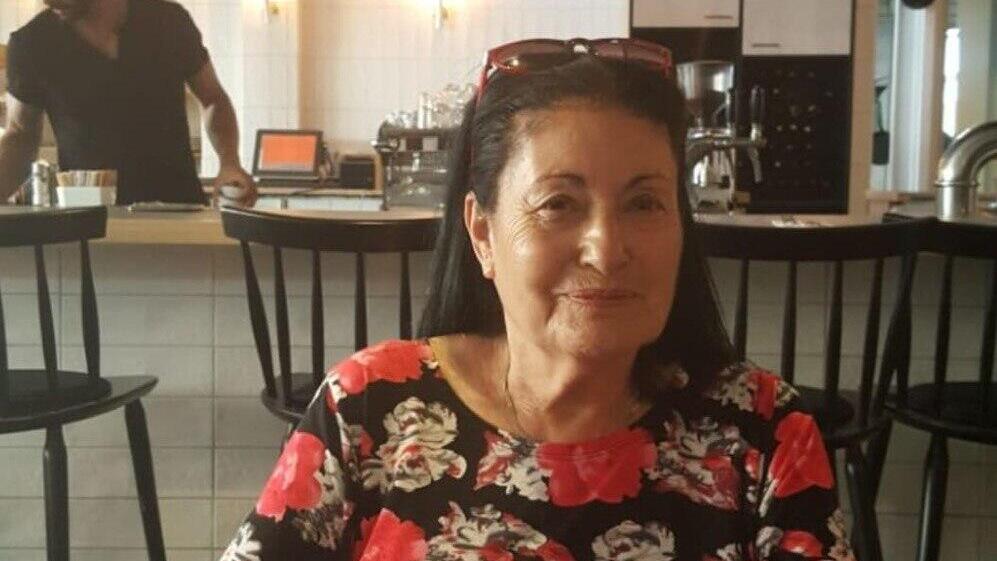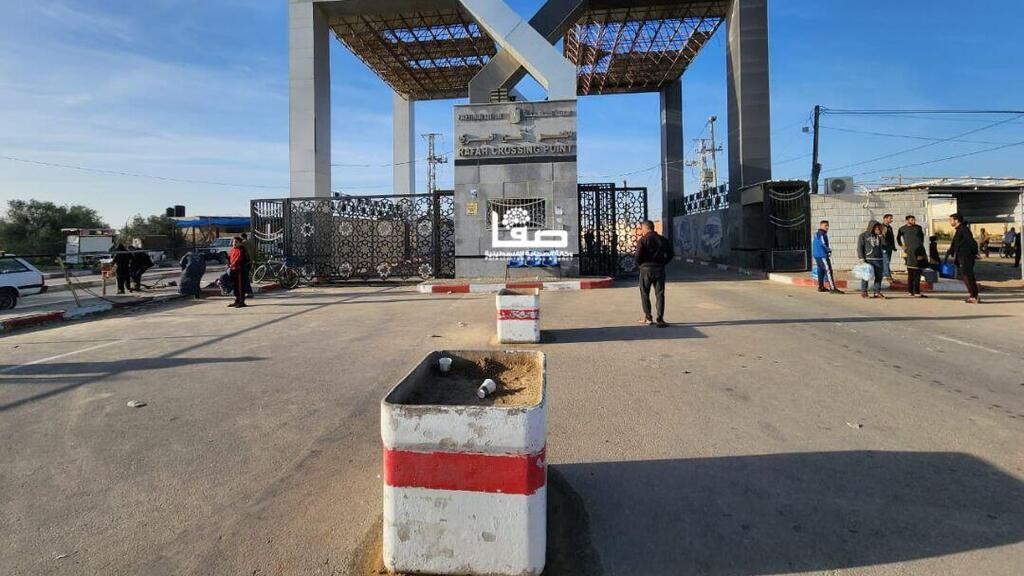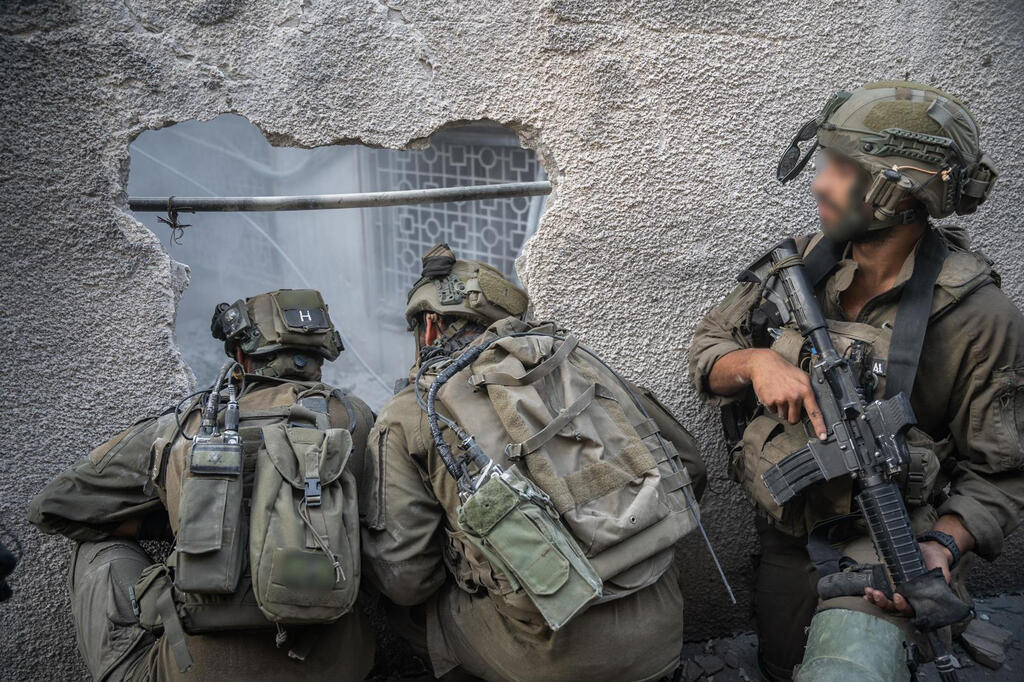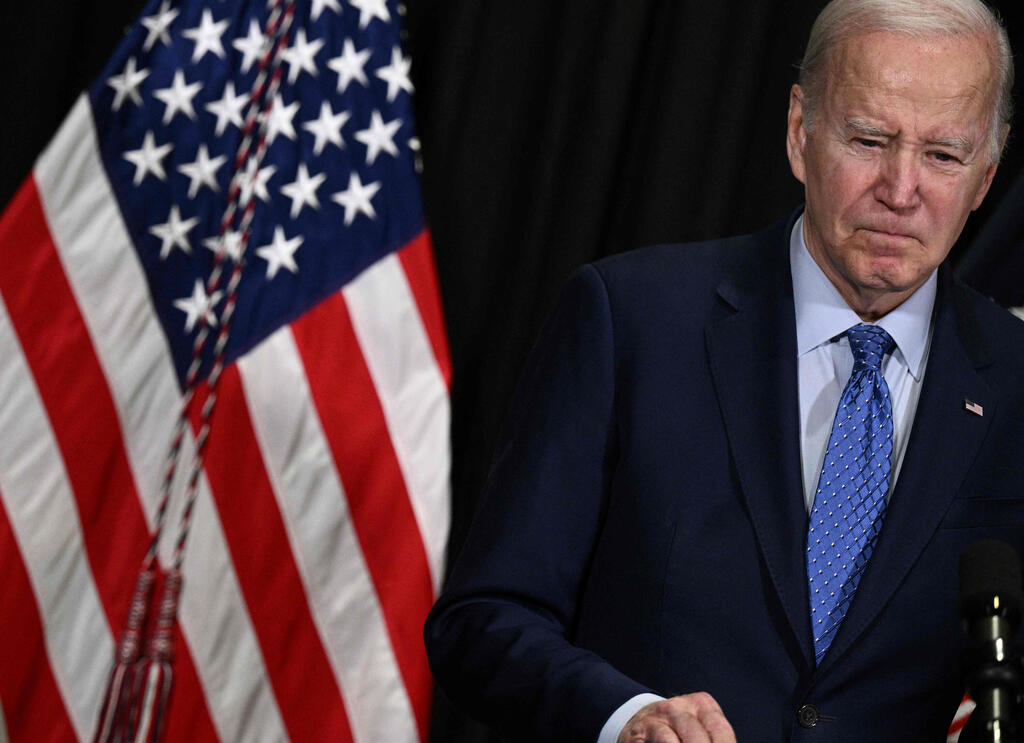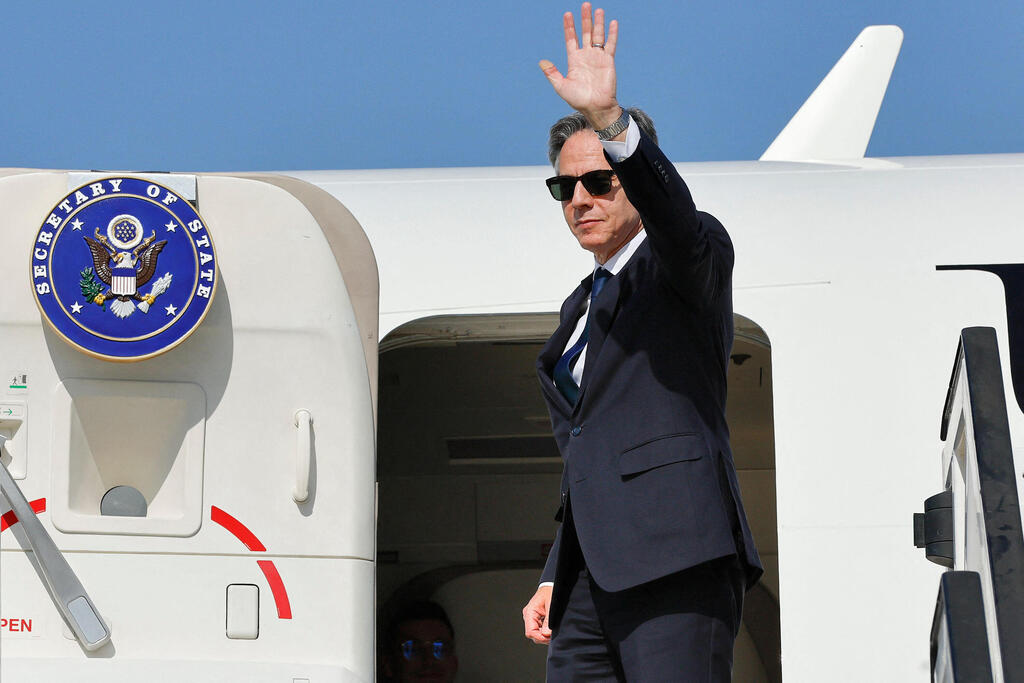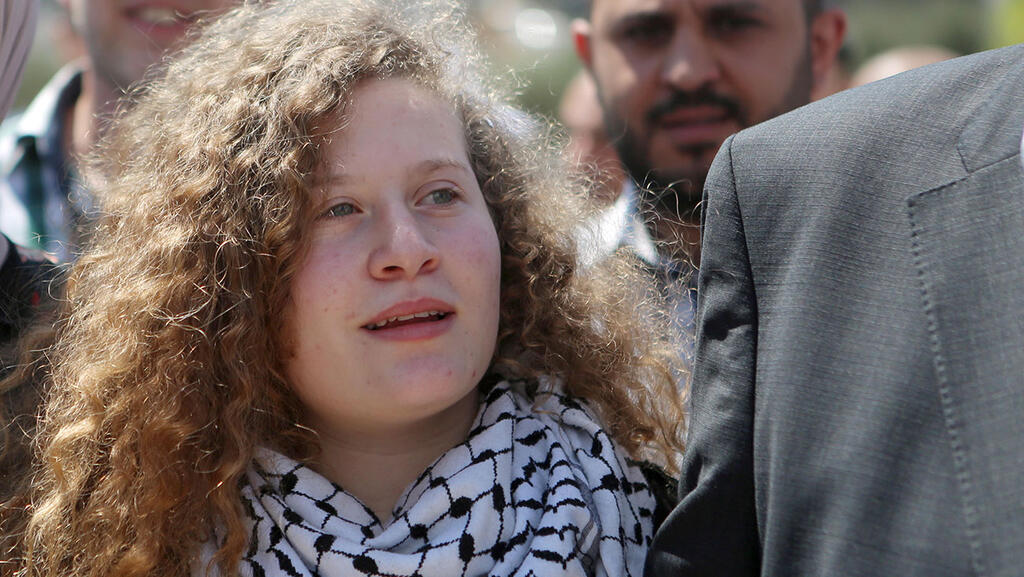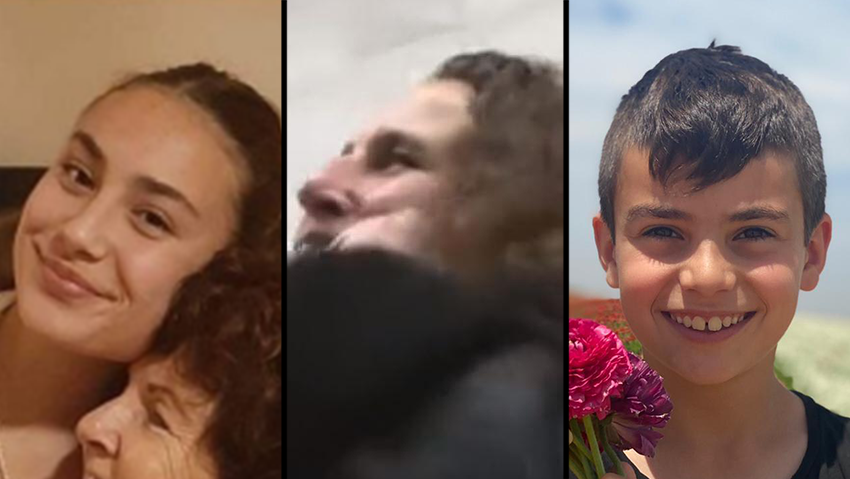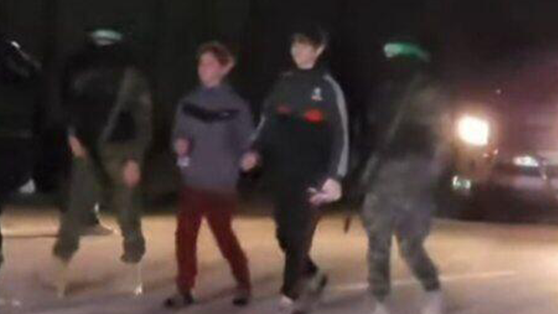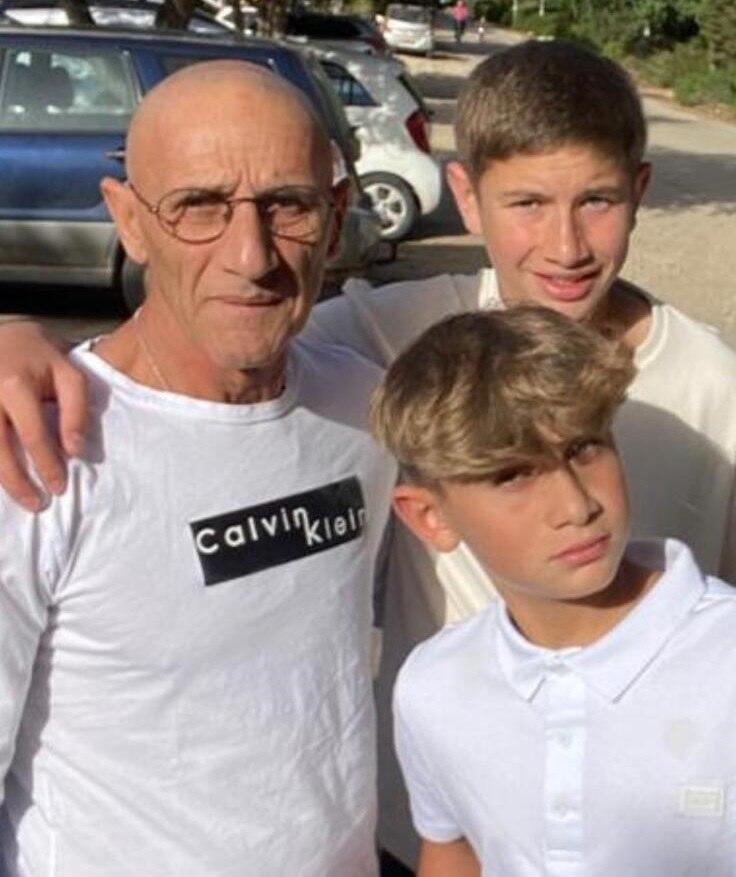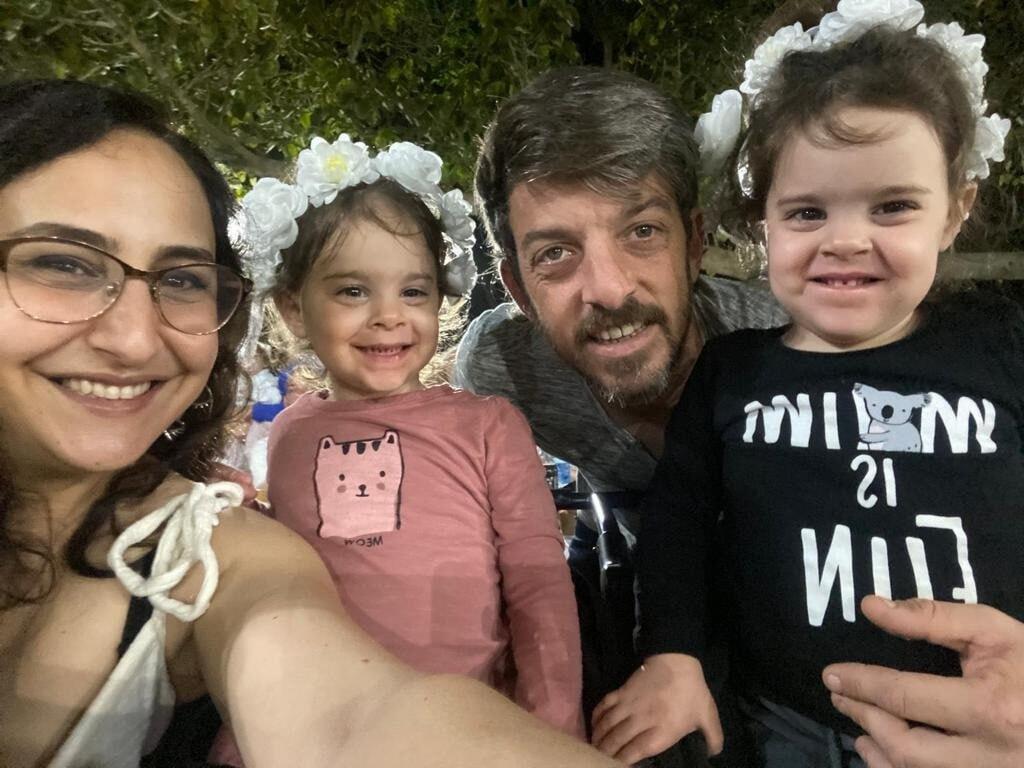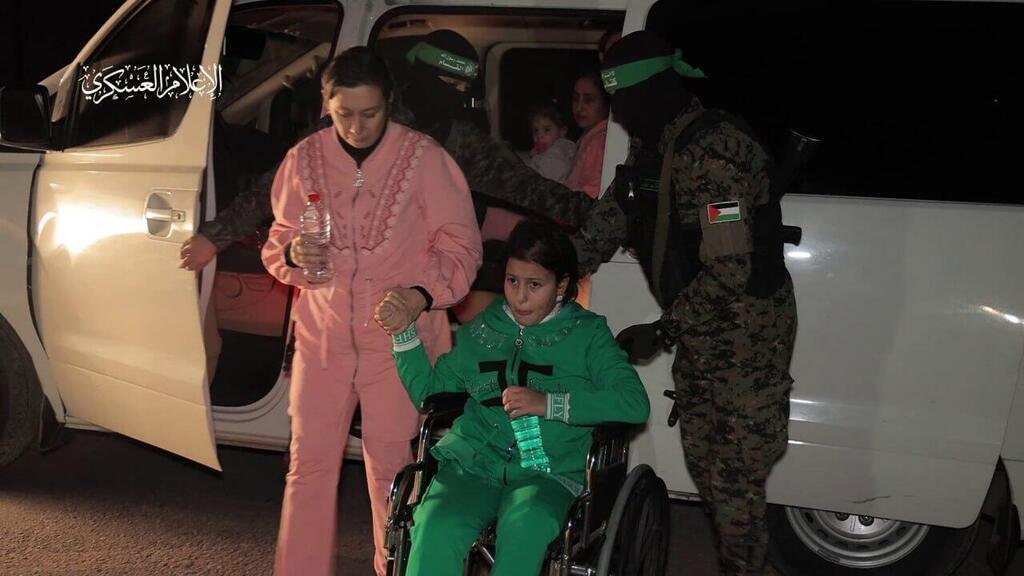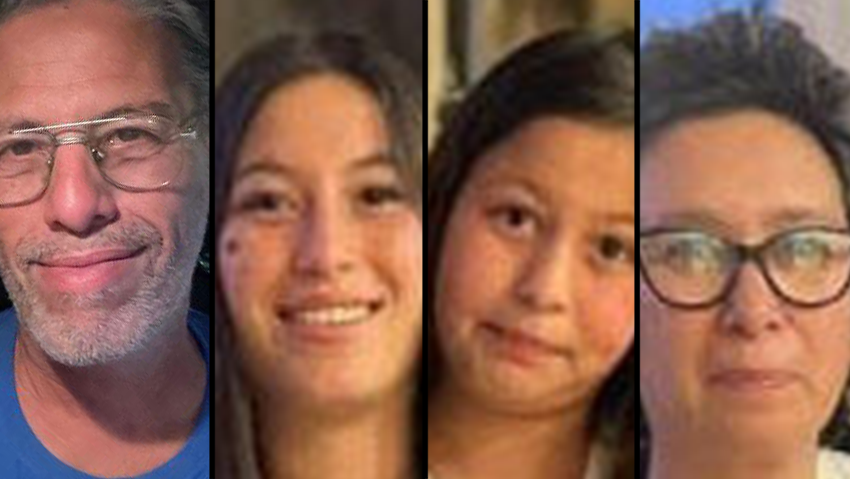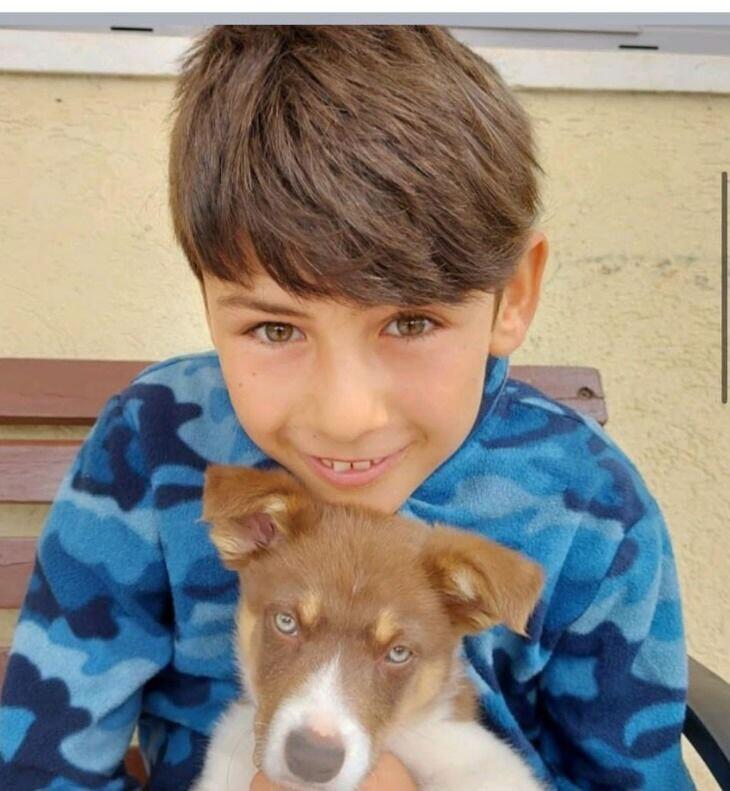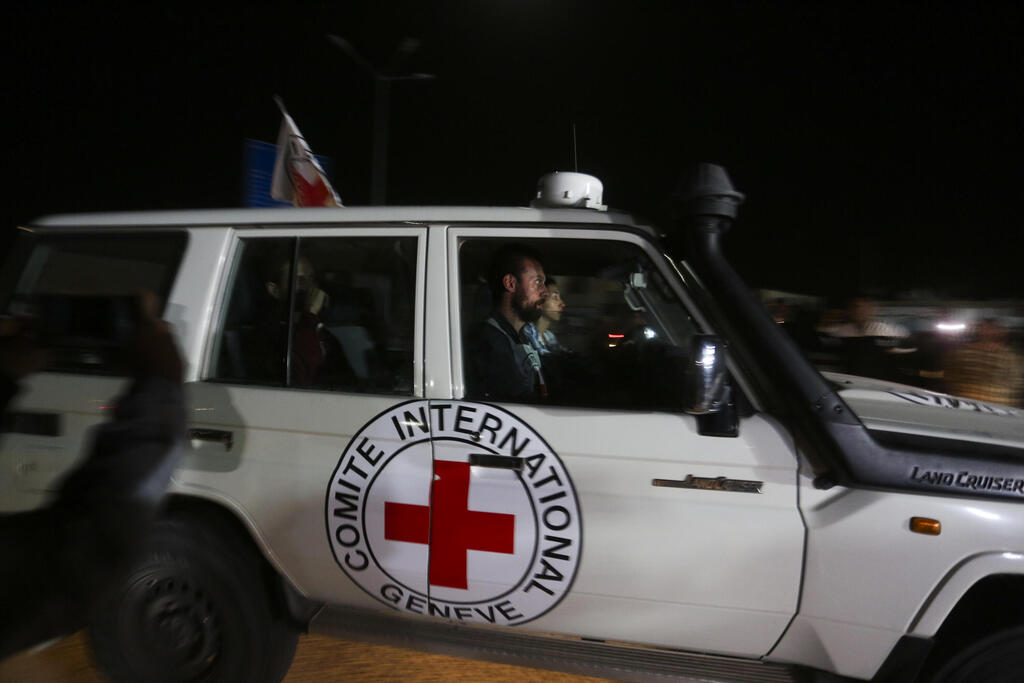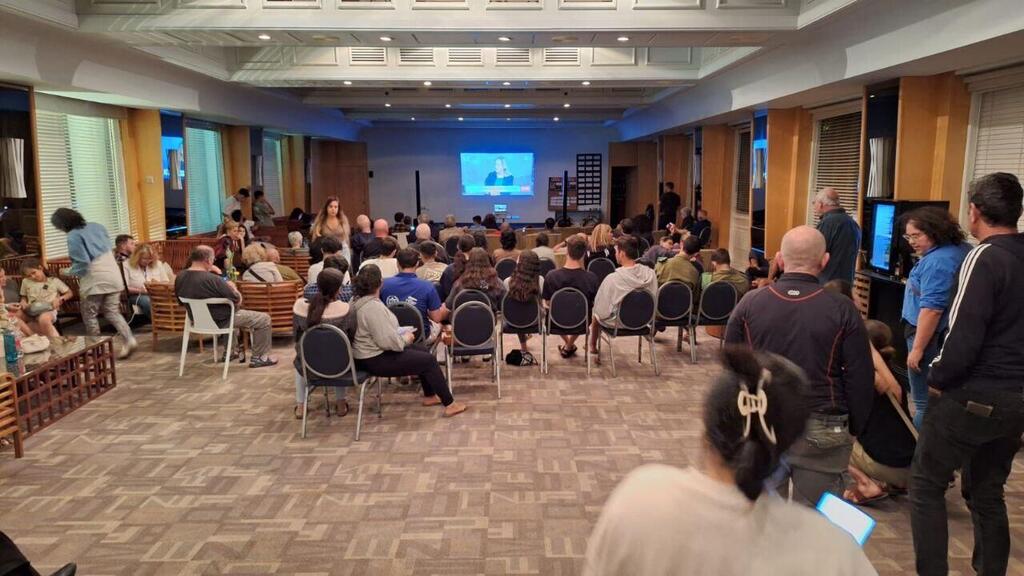Getting your Trinity Audio player ready...
Three IDF soldiers were killed on October 7 and their bodies are being held by Hamas in Gaza, the Israel Defense Forces announced on Tuesday evening. The soldiers are: Staff Sgt. Tomer Yaakov Ahimas, 20, from Lehavim; Sgt. Kiril Brodski, 19, from Ramat Gan; and Sgt. Shaked Dahan, 19, from Afula. Their deaths were declared based on evidence found by the IDF.
Read more:
The condition of 84-year-old Alma Abraham, who was kidnapped by Hamas and returned to Israel on Sunday, has improved, the hospital announced late Tuesday afternoon. Abraham was taken to the Soroka hospital by helicopter, and for more than a day she was unconscious while being ventilated and receiving support for her collapsed body systems. The hospital said in a statement that "in the last few hours she is conscious, breathing on her own and does not need the same level of support she needed upon her arrival." The director of the intensive care department, Dr. Motti Klein, said that "despite the improvement in her condition, she still needs continued monitoring and follow-up within the intensive care department."
21 View gallery
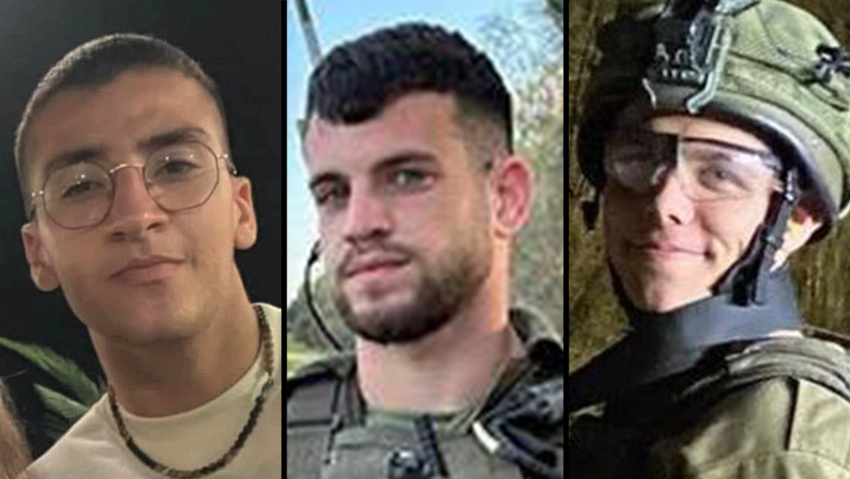

Staff Sgt. Tomer Yaakov Ahimas, 20, from Lehavim; Sgt. Kiril Brodski, 19, from Ramat Gan; and Sgt. Shaked Dahan, 19, from Afula
(Photo: IDF Spokesman's Unit)
Minister Benny Gantz said during a visit to the south that "after the cease-fire, the war will resume. The entire War Cabinet is united in this position. There is no other option." According to Gantz, "we are preparing for the next stages of the war, and for expanding the maneuver in the Gaza Strip as a whole. It will not be a city of refuge for terrorists and Hamas leaders. We are committed to the security of the residents of the south and the north and to all citizens of Israel, and we will not return until we carry this out."
Meanwhile, Finance Minister and member of the political-security cabinet Bezalel Smotrich announced that he opposes the possibility of a deal that would include a cessation of hostilities in the Gaza Strip in exchange for the release of all the hostages. "Not on the agenda, not even as a proposal. There is no discussion about it at all," Smotrich wrote on the X social network platform. "This is a plan to eliminate the State of Israel. We continue until complete victory."
United Nations aid chief Martin Griffiths will travel to the Jordanian capital Amman on Wednesday for talks on the possibility of opening the Kerem Shalom crossing to allow for humanitarian aid to enter Gaza from Israel. Located at the intersection of Israel, the Gaza Strip and Egypt, the Kerem Shalom crossing was used to carry more than 60% of the truckloads going into Gaza before the current conflict. Aid currently being allowed into Gaza comes through the Rafah crossing on the Egyptian border, which was designed for pedestrian crossings and not trucks.
"We have said from start we need more than one crossing," Griffiths told a briefing of member states at the United Nations in Geneva on Tuesday. "The opportunity to use Kerem Shalom should be explored, and that will be topic in Amman. It would hugely add scope (to the response)." A Western diplomat said there was no prospect of opening the Kerem Shalom crossing for the moment. The diplomat said that Israel does not want to open the crossing because their troops are located in the area. There was no immediate comment from Israel.
Three explosive devices were detonated in two separate incidents near IDF forces in the northern Gaza Strip in violation of cease-fire agreements, the IDF said on Tuesday.
The army added that in one of the incidents, “terrorists also opened fire at the troops, who responded with fire” and that a number of soldiers “were lightly injured.”
“In both incidents, the troops were located in positions as per the framework of the operational pause,” the IDF said in a statement.
The Qatari newspaper Al-Araby Al-Jadeed later reported that the Izz ad-Din al-Qassam Brigades, the military wing of Hamas, detonated the three explosive devices in the northern Gaza Strip near IDF forces, in violation of the cease-fire agreements.
Meanwhile, Abu Obaida, the spokesperson for Hamas's military wing, claimed that the terror organization's operatives engaged in a battle with the IDF in the northern Gaza Strip.
"Due to a clear violation of the cease-fire by the enemy, there were clashes, and our fighters dealt with it. We are committed to the cease-fire as long as the enemy adheres to it and call on mediators to press the occupation to comply with all cease-fire conditions on the ground and in the air."
Since Tuesday morning, Palestinians have reported gunfire in the area of the Sheikh Radwan neighborhood in Gaza City.
Mossad Director David Barnea arrived in Doha on Tuesday to meet with CIA Director William Burns and Qatari officials to advance ongoing and future negotiations for releasing hostages held in Gaza.
Israeli officials anticipate Tuesday’s phase of releases, mainly involving women and one girl, to go smoothly, barring unexpected issues. Efforts are underway to "improve" the list of hostages, though officials stress there are no particular issues with the current outline.
21 View gallery
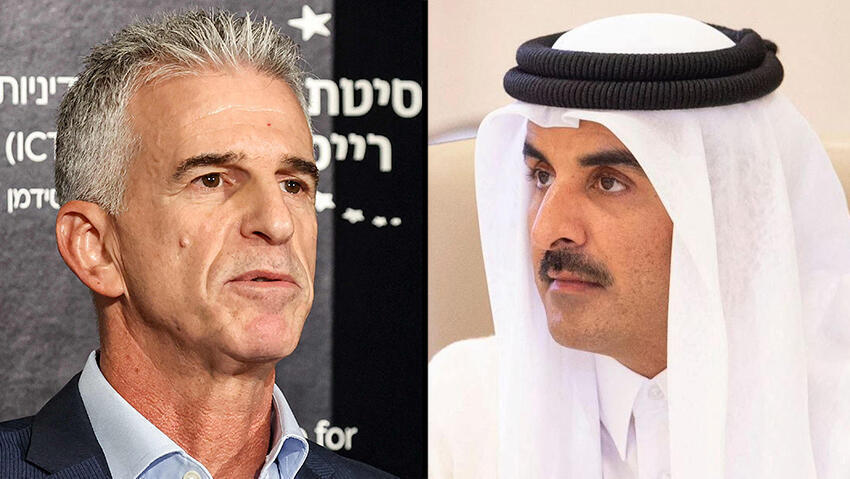

Mossad Director David Barnea and Amir of Qatar Sheikh Tamim bin Hamad Al Thani
(Photo: Reuters GIL COHEN-MAGEN/AFP)
The Washington Post reported that discussions will focus on securing the release of male captives and soldiers, noting that until now, only children and female civilians have been released as part of the deal.
A senior U.S. official told Ynet that Washington was interested in further extending the truce in Gaza in return for the release of additional hostages.
The U.S. is asking Israel to take greater care to protect civilians and limit damage to infrastructure if it launches an offensive in southern Gaza to avoid further displacements that would overwhelm humanitarian efforts, senior U.S. officials said.
The Israeli offensive in northern Gaza has proven devastating, with thousands of Palestinians killed and vast numbers of survivors left homeless and forced to flee south by a relentless bombing campaign and a lack of essentials such as food, power and water.
As Israel begins to look toward south Gaza to continue battling Hamas terrorists after a pause in fighting to release hostages, U.S. officials said they have been talking to the Israelis about taking greater care in the south, where there were now about 2 million people.
U.S. Secretary of State Antony Blinken will return this week to the Middle East as the U.S. hopes to find a way to extend a cease-fire in Gaza and get more hostages released, the State Department said Monday. It will be his third trip to the region since Israel's war with Hamas began last month.
In Israel and the West Bank, Blinken will “discuss Israel’s right to defend itself consistent with international humanitarian law, as well as continued efforts to secure the release of remaining hostages, protect civilian life during Israel’s operations in Gaza, and accelerate humanitarian assistance to civilians in Gaza,” State Department spokesman Matthew Miller said in a statement.
Jibril Rajoub, the head of the Palestinian Football Association and secretary of Fatah's Central Committee, said in an interview with MBC Egypt that "what happened on October 7 was part of a defensive war by the Palestinians, and the next, more violent explosion will be in the West Bank."
He warned of the possibility of deception by Israel regarding the cease-fire in the Gaza Strip and claimed that the truce agreement lacks any guarantees or monitoring. According to him, the events of October 7 must be a "turning point."
Chopper brings released hostages to Ichilov Hospital
Families of hostages due for release on Tuesday were notified in the early morning about their loved ones' impending freedom, following the government's receipt and review of the list of names. Ten hostages are set to be released on the first day of the extended truce in the Gaza war, a negotiation facilitated by Qatar, Egypt and the United States.
The Justice Ministry released a list of 50 Palestinian prisoners scheduled for release in exchange for additional hostages. Included is 22-year-old Ahed Tamimi, who was arrested earlier this month for incitement to terrorism on her Instagram feed.
Tamimi, often viewed as a symbol of Palestinian resistance, was released from Israeli prison in 2018 after serving an eight-month sentence. She was arrested at 17 for striking an IDF soldier, an incident her mother filmed and broadcast live on Facebook. The confrontation occurred outside their home in the West Bank village of Nebi Salah, a frequent site of clashes with troops and settlers from the nearby settlement of Halamish, also known as Neve Tzuf. In 2017, a village resident stabbed to death three settlers and wounded a fourth in an attack.
Director of the Dana Children's Hospital at Tel Aviv's Ichilov Medical Center, Professor Dror Mandel, said early on Tuesday that the hostages who were admitted after their release on Monday, were after first examination in stable condition and were being cared for in a dedicated and secluded area, to provide them with a quiet and calm environment and with the best medical care and support.
21 View gallery
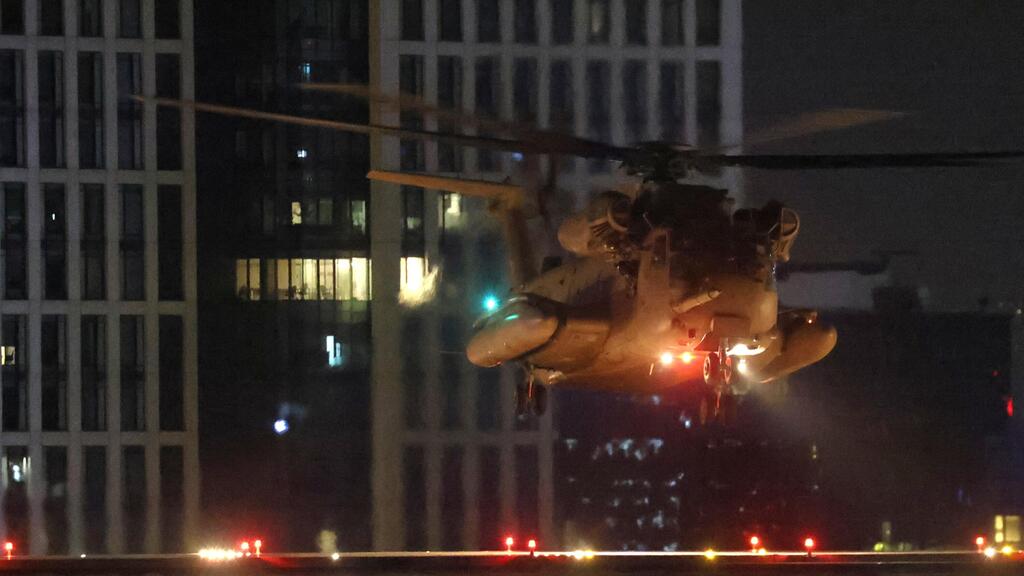

A chopper carrying freed hostages lands at the Ichilov Medical Center in Tel Aviv on Monday
(Photo: Shaul Golan)
The hostages freed were taken from their homes in Kibbutz Nir Oz on October 7 but 49 additional captives from Nir Oz remained held in Gaza, including children, mothers, fathers, grandfathers and grandmothers.
21 View gallery
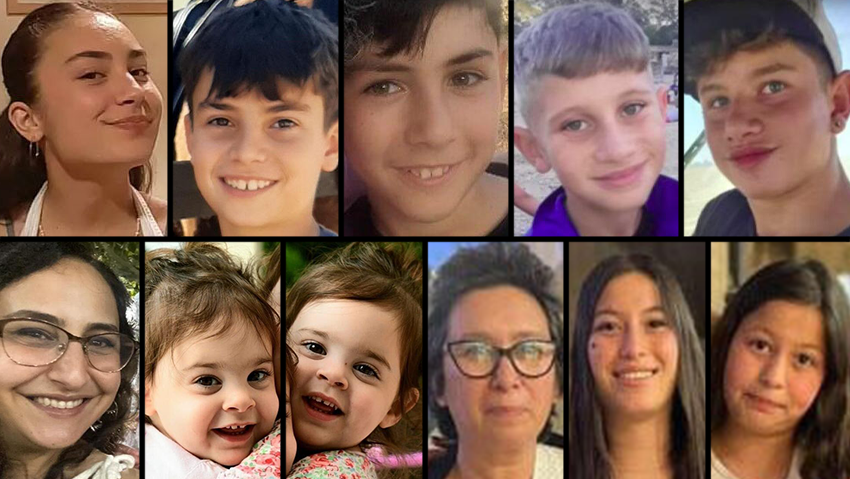

Top L-R: Sahar Calderon, Erez Calderon, Eitan Yahalomi, Yagil Yaakov, Or Yaakov, Sharon Aloni Cunio, Emma Cunio, Yuli Cunio, Karina Engel-Bart, Mika Engel and Yuval Engel
21 View gallery
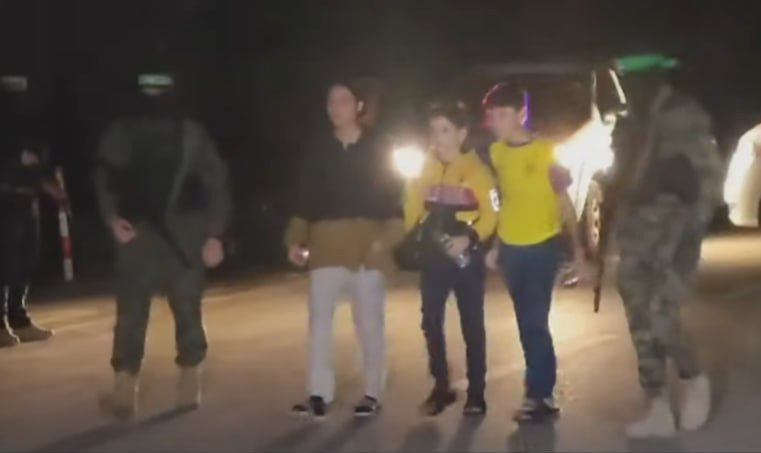

Sahar and Erez Calderon and Eitan Yahalomi handed over to Red Cross
(Photo: Screenshot)
21 View gallery
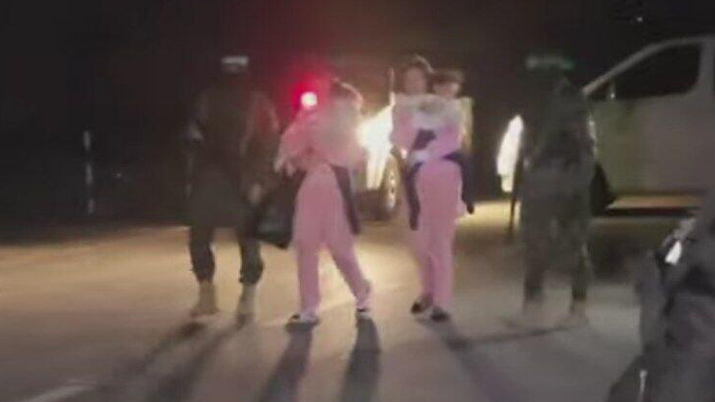

Sharon Cunio and Mika Engel holding Cunion's little daughters Yuli and Emma
(Photo: Screenshot)
The eleven hostages are Sharon Aloni Cunio, 33, and her twin daughters Yuli and Emma, 3; Karina Engel-Bart, 51, and her daughters Mika, 18, and Yuval, 10; siblings Sahar, 16, and Erez, 12, Calderon; siblings Or, 16, and Yagil, 12, Yaakov; and Eitan Yahalomi, 12.
All children will be separated from their fathers who will remain in captivity. They are David Cunio, Ronen Engel, Ofer Calderon, Ohad Yahalomi and Yair Yaakov and his partner Meirav Tal.
Sahar and Erez Calderon
Hadas Calderon, from Kibbutz Nir Oz, has been one of the leaders in the Families' Struggle for the Release of the hostages since October 7. On Tuesday, she will finally be able to meet her children, Sahar (16 years old) and Erez (13 years old), who were kidnapped by terrorists from the kibbutz.
However, the joy is far from complete. Their father, Ofer Calderon, remained in Gaza. Erez was seen in a video posted by the terrorists from Gaza and that's when Hadas - who was in a nearby house and rescued after eight hours in the safe room - realized that her son, her daughter and her ex-husband had been kidnapped to Gaza. 80-year-old Carmela Dan, Erez and Sahar's grandmother, and her granddaughter Noya, a 13-year-old on the autistic spectrum, were murdered in the Hamas attack in Nir Oz.
Or and Yagil Yaakov
Or Yaakov, 16, and his brother Yagil, 13, were alone in their home in Nir Oz on October 7 and hid in the safe room. They managed to inform their mother about the terrorists' infiltration. "Don't take me, I'm too young," the boys' mother Renana heard over the phone Yagil say to his kidnappers. On that same day, the two were seen in a video that was circulated online.
This was not the last time Yagil was seen in Gaza. In a psychological terror video published by Islamic Jihad, he was filmed next to Hana Katzir, who was released in the first phase of the hostage deal. On Monday night, they were returned to Israel and reunited with their mother. However, in addition to the two brothers, their father Yair and his partner Meirav Tal were also kidnapped to Gaza where they remain in captivity.
Sharon Aloni Cunio, and her twin daughters Yuli and Emma
On Friday, Daniel Aloni and her 6-year-old daughter Emilia returned home from Hamas captivity. On Monday, the family welcomed Daniel's sister, Sharon Aloni-Cunio and her three-year-old twin daughters Yuli and Emma. However, father David Cunio, his brother Ariel and his partner Arbel Yehud remained in Gaza.
Karina Engel-Bart, and her daughters Mika and Yuval
She managed to defeat cancer and survived captivity: Two years after recovering from cancer, Karina Engel-Bart returned to Israel on Monday, after 52 days in captivity in Gaza. She was accompanied by her daughters Mika, 18, and Yuval, 11. Yuval suffered a leg injury on October 7 and was documented being transported into a Red Cross vehicle in a wheelchair. Karina's partner, Ronen Engel, is still in captivity.
Ronen's brother, Danny, shared that on the morning of the massacre, he corresponded with Ronen on WhatsApp. "After seeing pictures of terrorists entering Be'eri, I messaged Karina. She wrote that they were in the safe room and that my brother was armed next to the door. That was my last contact with them." Since then the family has been in captivity in Gaza. Monday night, the mother and daughters returned to Israel without their father.
Eitan Yahalomi
Eitan Yahalomi, 12, was abducted from Nir Oz to Gaza along with his father Ohad. After 52 days in captivity, he finally returned to Israel and will reunite with his mother Bat Sheva, his younger sister Yael, 10, and his other sister, a baby. However, Ohad, who protected his family, was shot by the terrorists and kidnapped; he did not return with Eitan.
"On that Saturday, we woke up at 6:30 to the sirens, and we all went to the safe room," said Bat Sheva, Eitan's mother. "At a certain point, we began to hear machine gun fire on the house. The door to our safe room wouldn't close, so Ohad decided to go out and wedge the door shut for us – it was the only way to secure it. He told us from beyond the door that he loves us and messaged friends that he hears the terrorists and we don't have much time. Around 10:00, they broke into the house, shot Ohad and managed to enter the safe room.
"Four armed terrorists pointed their weapons at us and forced us to come out. We saw Ohad sitting injured; he told us to go with them and that he loves us. One of them filmed me, and I pleaded in the video that they take me and not the children. They took Eitan on one motorcycle and me with the girls on another and drove toward the border.
"As we saw the Gaza settlement facing Nir Oz, two tanks appeared. The terrorists panicked and started firing in all directions. Our motorcycle fell to the side, and the motorcycle with Eitan continued ahead, and I haven't seen it since. We ran, in our pajamas, barefoot, through the fields. The missiles whizzed over our heads. We reached the kibbutz factory, which wasn't on fire, and saw a bus arriving - it was the first bus with soldiers that came to Nir Oz. After a while, they entered our home and didn't find Ohad. A few days later, we received a message that he had been kidnapped."
The chairperson of kibbutz Nir Oz, Osnat Perry, said, "There is a great sigh of relief in the kibbutz tonight, but at the same time, there is great concern for our loved ones still held by Hamas. We demand the immediate return of all the hostages, at any cost required."
The Health Ministry said that the Sourasky Medical Center in Tel Aviv is fully prepared to welcome the 11 returned captives and they will be provided with necessary medical and psychological care. Per the Ministry's statement, the freed abductees will have their first reunion with their families since their capture at the hospital.
Meanwhile, the Government Secretariat has requested ministers to approve an increase in the optional list of names for release in the hostage exchange deal by about 60, in addition to the 300 already approved by the government.
A political source said that this decision was made to expand the negotiating room with Hamas. According to the agreed-upon framework, one Israeli captive is to be released for every three Palestinian prisoners.
This comes after a White House official confirmed that Israel and Hamas have agreed to extend the truce in Gaza, without offering more details.
Earlier, Hamas confirmed to mediators that "it has a phase ready for an additional day of releasing captives," without providing further details, according to a report in the Qatari newspaper Al-Araby Al-Jadeed.
Meanwhile, an Egyptian source revealed that "negotiations are underway regarding guarantees requested by Hamas related to Israel, including the entry of fuel trucks and their delivery to hospitals in northern Gaza Strip."
Additionally, the same source stated that "Hamas has informed mediators it has evidence of several captives held by the Islamic Jihad, which could extend the cease-fire by another four days," but added that "the matter is subject to further guarantees."
The source also noted that "mediators demanded that the cease-fire should also include the West Bank and East Jerusalem, to ensure that the violations of the occupation cease throughout the negotiation period."
First published: 07:50, 11.28.23



